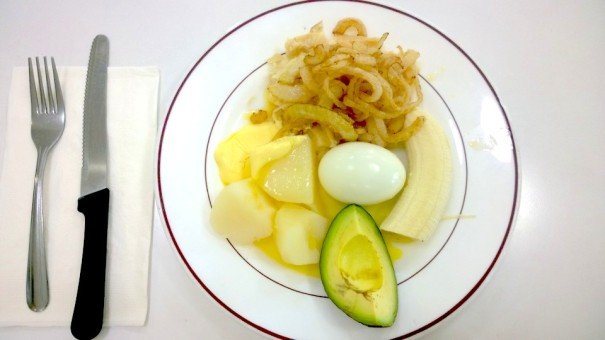
Being an Onion in Bermuda

Being an Onion in Bermuda
Cod in Bermuda
There are many parts of the world where breakfast is not any different from other meals, where there’s no such thing as “breakfast food”. But in the West, breakfast is special, and there tends to be a story behind what gets eaten in the mornings. Like feast meals, Thanksgiving, say, or Christmas, breakfast foods tend to be traditional foods, conservative foods, foods with a history.
Bermuda, a full-blooded member of the Western world as England’s oldest colony, is fond of its weekend breakfasts, which mostly look like this. That mess at the top is mostly cod. Newfoundland cod. Fish is not an unpopular breakfast food in the Caribbean – they eat salted or dried in various forms – but it’s not, for the most part, Newfoundland cod. The reason why this is on my plate is slavery. And rum.
In the 18th century, Bermuda was part of the great British trade triangle, which brought slaves from Africa to Britain and its island colonies, manufactured goods from Britain to British North America, and cod from Newfoundland to Bermuda (and Jamaica, and the rest of the British West Indies). The only reason the Bermudians and other slave colonies got it at all was that Newfoundland, and to a lesser extent New England, simply produced too much of it for the European market, so they dumped the extra on the slaves (who were, incidentally, more Irish than African, though they also included Native Americans).
There are stories behind the banana (though not native to the island, they were grown here before most people in England had ever heard of them) and the potatoes (brought as one of several cash crops with which the island tried, and failed, to replace the income lost from slaves), and even the eggs (Bermuda has quite the feral chicken problem), though I have no idea why there’s so much butter on the plate.
Mixed up with that mess of cod is onion. Bermuda onion, to be specific. For about 100 years, onions were, along with lilies, the cash crop that just about did manage to make up for the collapse of the trade triangle. The onions were, and are, famously sweet, and for the economic boom they brought to the island, they have taken on a special significance.
Mark Twain, a fan and frequent visitor, wrote in The Atlantic as early as 1877, “The Bermudian weeping over the departed exhausts praise when he says, ‘He was an onion!’ The Bermudian extolling the living hero bankrupts applause when he says, ‘He is an onion!’ The Bermudian setting his son upon the stage of life to dare and do for himself climaxes all counsel, supplication, admonition, comprehends all ambition, when he says, ‘Be an onion!’”
And fried up, on a Sunday morning, mixed in with some cod and served on the U-shaped diner counter at The Paroquet (pronounced “parakeet”) in Camden, just outside Hamilton, they do taste pretty good.